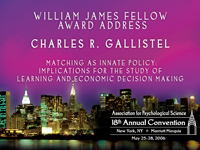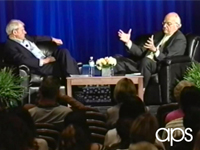David Myers on Teaching Psychological Science Through Writing
David Myers, Hope College, was prevailed upon to deliver the inaugural APS Lecture on Teaching Psychology at the APS 18th Annual Convention. His address, “Teaching Psychological Science Through Writing,” focused on the sharing of psychological knowledge through forms of writing (“printed squiggles,” as he called them). A prolific author, Myers described writing as a powerful medium that is a form of agency and a way to effect change.
This annual lecture, presented yearly at the APS Annual Convention, is supported by the APS Fund for Teaching and Public Understanding of Psychological Science. With his wife, Carol, Myers pledged a $1 million endowment that was, he said, “motivated by the importance of psychological science as a source of great insights, as a strategy for restraining unbridled intuition with empirical scrutiny, and as a vehicle for advancing human understanding and compassion.”
Writing allows psychologists to reach a large audience. By writing op-ed essays, magazine articles, trade books, even Web sites, we’re educating the public and simultaneously promoting scientific psychology as a whole. Drawing from his experiences as a writer, Myers offered invaluable insight about how to start sharing.
“Writing, for most of us,” he explained, “begins with an urge, an urge to tell a story, an urge to replace seeming ignorance with information, an urge to, in some small way, change the world.” For Myers, this led him to write textbooks on general psychology, science articles, and books about spirituality from a scientist’s point of view. His latest writing accomplishment was bridging the divide between the religious community and scientists concerning the issue of gay marriage.
When choosing what to write, Myers suggested asking, “What do you know that others would benefit from? What can you write that won’t get said unless you write it?” Share that unique perspective, he advised.
As many people know, it’s not easy to write well. It takes dedication, a seemingly endless supply of hours, and a thick skin. Myers’ first textbook took a whopping 3,500 hours, one writing coach, and a hoard of reviewer criticisms just to finish.
So why even bother?
Because as Myers pointed out, even criticism is a form of teaching and learning. “One of our most challenging tasks as teachers,” he said, “is absorbing and benefiting from criticism without letting it defeat us.” The more you write, the more you learn — everything from proper syntax and grammar, to the latest breakthroughs in psychological science. Writing itself is a process of learning. “The ability to benefit from criticism,” he said, “while holding to one’s vision and voice grows with experience.” Myers seemed to imply that with a bit of practice, our little squiggles could turn into an elegant text worth sharing.
Along with other practical advice on writing, including how to escape procrastination and absorb rejection, Myers offered some tips for good writing, including these: Provide concrete examples for every abstract point; avoid using the passive voice; use an active voice; manage time with focus and weekly objectives; keep the audience in mind.
But he emphasized that beyond everything else, writing is a wonderful way to teach because authors change people’s minds about the world they live in and the people they live among.
“We teach to expand people’s frames of reference. We teach to excite curiosity. We teach to restrain intuition with critical thinking. We teach to restrain judgmentalism with compassion.” Through teaching, writing is a catalyst for change, and in this sense, a piece of writing is just as powerful as an action itself.
“The moments when we succeed,” said Myers, “we have done something well worth doing.”




APS regularly opens certain online articles for discussion on our website. Effective February 2021, you must be a logged-in APS member to post comments. By posting a comment, you agree to our Community Guidelines and the display of your profile information, including your name and affiliation. Any opinions, findings, conclusions, or recommendations present in article comments are those of the writers and do not necessarily reflect the views of APS or the article’s author. For more information, please see our Community Guidelines.
Please login with your APS account to comment.